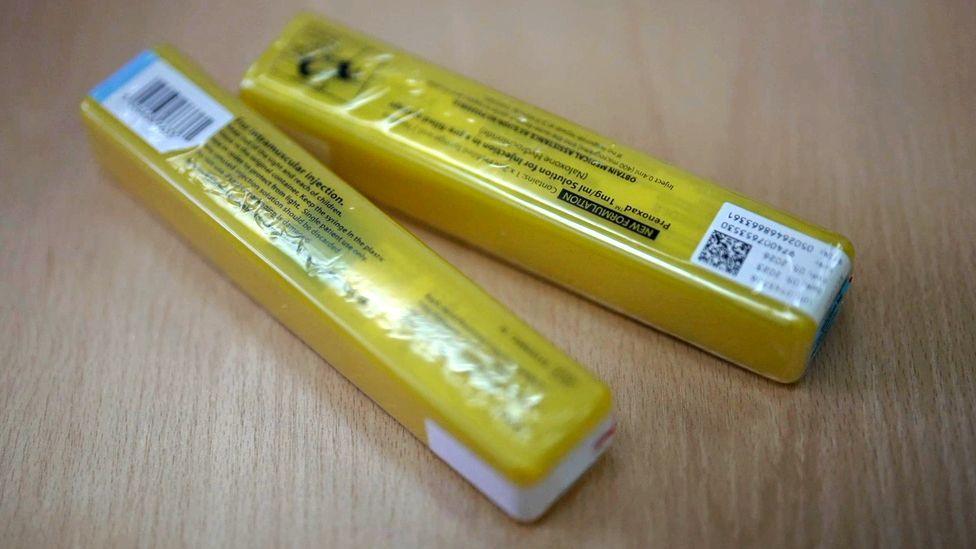Life-saving overdose drug to be given without prescription

Naloxone can save the life of someone who has overdosed
- Published
A life-saving anti-overdose drug is to be made available for use at home in England without a prescription.
The medicine, known as naloxone, will be given to addicts at risk of an opioid overdose for use in an emergency.
Police officers, social workers and probation officers are among those who will be allowed to distribute the medicine.
The measure was a key recommendation in a 2020 review of drug services.
Opioid-related deaths ŌĆō for example from heroin or powerful synthetic opioids like fentanyl - make up the biggest proportion of drug fatalities across the UK.
There is an average of 40 deaths a week across the country.
But administering the drug naloxone to someone who is overdosing can be life-saving, by easing potentially fatal breathing difficulties.
Many police officers and ambulance crews already have supplies for emergency use.
Until now, only drug and alcohol treatment services could provide naloxone for home use.
In March I reported on the efforts of the Blackpool-based charity Empowerment to help people come off drugs like heroin.
The "Lived Experience" team in Blackpool is made up of former drug addicts, many of whom told me that Naloxone had saved their lives, sometimes on multiple occasions.
The staff at Empowerment were among those who could give doses of the drug to their clients, knowing that if an overdose was to occur at home, this could be a lifesaving intervention.
The law is being changed to allow paramedics, the police, social workers, probation officers and those working with the homeless to provide take-home supplies.
England's Health Secretary Victoria Atkins said the aim was to reduce annual drug-related deaths by 1,000 by 2025.
ŌĆ£Opioid addiction can ruin lives and is responsible for the largest proportion of drug-related deaths across the UK," she said.
ŌĆ£We are working hard to reduce those numbers by expanding access to naloxone to save the lives of the most vulnerable.ŌĆØ
The measure was a key recommendation in a by Prof Dame Carol Black, who welcomed TuesdayŌĆÖs announcement.
ŌĆ£When I did my independent review of drugs, I heard first hand what a life-saving intervention naloxone is," she said.
ŌĆ£Widening access to naloxone is key to reducing the number of lives lost to overdose and will help support the government's ambition to prevent nearly 1,000 deaths in England by the end of 2025.
"I am pleased to see such a strong positive response to the consultation and welcome the government moving forward with these important changes.ŌĆØ
The Black report also called for changes to the recruitment and training of the workforce that specialises in helping those struggling with drug and alcohol addiction.
The government has now revealed what it says is a 10-year plan to transform the workforce, including funding for 800 more medical and mental health drug workers, 950 additional drug and alcohol and criminal justice workers, and more posts to organise and co-ordinate teams in local councils.
There will also be improved and more formalised training and accreditation for drug workers.
Clare Taylor, chief operating officer at Turning Point, a social enterprise that works with those struggling with drink and drug addiction, said the workforce plan should help to improve the services that are available.
ŌĆ£The new workforce plan sets out a clear set of actions to increase capacity in the system and the quality of services," she said.
ŌĆ£It recognises the need for the right mix of medical and mental health professionals working alongside key workers and peer support workers, and should help strengthen clinical governance to enable the best possible outcomes for the people we support.
ŌĆ£Working in this sector can be incredibly rewarding, and formalising training routes and developing better opportunities for career progression will help ensure itŌĆÖs a sector people want to join.
ŌĆ£Continued funding of the drug strategy beyond March 2025 is now essential in ensuring these plans can come to fruition and we as a sector are able to reach more people."